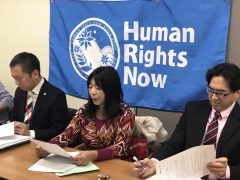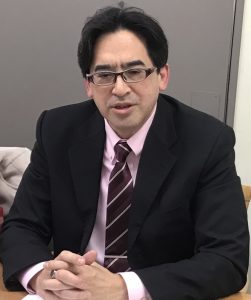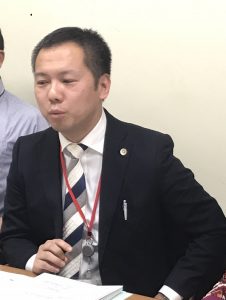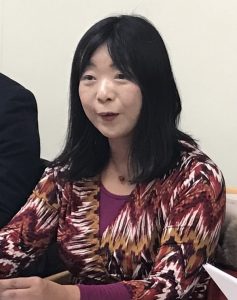Human Rights Now has issued a statement on human rights concerns in the Japanese apparel industry.
After receiving results from a questionnaire, Human Rights Now and the Business and Rights Resource Center held a press conference on “Results of Human Rights Policy Survey in the Japanese Apparel/Sports Wear Industry” on Friday, December 21. This was followed by the release of a statement, “Human rights concerns in the Japanese apparel industry. A majority of companies fail to implement mechanisms to either prevent or address human rights abuses.”
You can download the original PDF (English) from here:
StatementHuman-rights-concerns-in-the-Japanese-apparel-industy
Human rights concerns in the Japanese apparel industry
A majority of companies fail to implement mechanisms to either prevent or address
human rights abuses
Human Rights Now
Business & Human Rights Resource Centre
Human Rights Now, an international human rights NGO based in Tokyo,, and the Business & Human Rights Resource Centre, an international human rights NGO headquartered in London, have published the findings of a joint survey of the human rights policies and practices of 62 top apparel companies in Japan. The survey was based on a questionnaire sent to companies. The results illustrate that, aside from a small group of leading companies, most apparel
companies in Japan have yet to address human rights concerns adequately. The key findings include:
1) The response rate was low, with nearly two thirds of companies, including leading
domestic Japanese companies, failing to respond to the questionnaire.
2) The mechanisms
in place within most companies to implement human rights remain in the very early stages of
development.
3) There was a distinct difference between the foreign companies and the
Japanese companies. The Japanese companies, in general, lag behind .
This is a grave concern and needs to be addressed. We urge the apparel industry in
Japan to effect a significant improvement, in particular by the Tokyo 2020 Olympics.
The response rate
The questionnaire was sent to 62 companies. 21 companies responded, amounting a response rate of just over one third (33.8 percent). The companies chosen for
investigation included the top four global industry leaders Inditex (Spain), H&M (Sweden), FAST RETAILING (Japan) and Gap (USA), as well as the top 30 domestic Japanese companies, and further additional companies with brand recognition for sports, outdoor, and children’s clothing. The questionnaire was sent individually to each company via post or e-mail in July 2018.
Of these top companies, those that did not respond included Shimamura, World, Aoyama Trading, United Arrows, Gunze, Nishimatsuya Chain, Pal Group Holdings, Right-on, Aoki Holdings, Atsugi, and other well known names. Half of the top 10 companies (as listed in table 1) ; 37 percent of the top 30 companies responded. Some companies, such as Aoyama Holdings and United Arrows, flatly declined to answer any human rights-related questions. Others were not even aware which department within the company were responsible for responding, or had no department for this matter at all. The results are detailed in table 1.
Insufficient human rights policy/mechanisms in many companies that did respond Of the 21 companies which did respond, 12 companies had a human rights policy or procurement guidelines in line with international standards: Fast Retailing, Wacoal Holdings, Honeys Holdings, Daidoh, Gap, H&M, Aeon, Ito-Yokado, adidas, Asics, Mizuno, Sankisyoko (Mikihouse) and Patagonia. The remainder either had no human rights policies at all, insufficient policies (including human rights policies that did not refer to the Universal Declaration of Human Rights or ILO standards), or only general principles. Nevertheless, the number of companies which have established CSR procurement guidelines seems to be increasing – a positive trend. 3 companies out of the 21 that responded had no procurement guidelines for their suppliers, nor any implementation mechanism for their human rights policies. Notably, 8 companies stated they did not conduct human rights due diligence. Whilst H&M, adidas, Gap, Patagonia, Fast Retailing, Asics, and Mizuno stated they conduct human rights due diligence , only 6 of the remaining 14 domestic Japanese companies had a process in place. Only 14 companies carry out regular human rights audits of their suppliers.
Traceability and disclosure of supply chain
Traceability also remains a challenge. 6 companies stated they could track products to tier 1 suppliers, 9 companies to tier 2, and 5 companies to tier 3. Companies need to have a better grasp further down their supply chain, given the many human rights issues reported in connection with the cotton harvest, such as child labour, environmental pollution and public health repercussions from certain agricultural and chemical substances. Only 3 companies, all non-Japanese companies (GAO, adidas and Patagonia) have disclosed their full supplier list. 5 companies (Fast Retailing, Wacol Holdings, H&M, Asics and Mizuno) have partially disclosed their suppliers. The remainder answered as having no disclosure. This is a great challenge for the Japanese apparel industry.
Technical intern trainees
The Technical Intern Training Program (TITP) has been a hotbed of human right abuses in Japan. Despite the longstanding reports of abuse, 6 companies had no
knowledge of whether their suppliers employed foreign labourers through the TITP. 13 companies responded that their suppliers did use foreign labour through the TITP, and 2 companies responded that there were no TITP ‘trainees’ in their supply chain. Measures taken to prevent abuses within the TITP framework varies dramatically, ranging from companies that commit to audit suppliers that employ foeign labour through the TITP to companies that merely distribute information sheets. As a whole, the measures taken by most companies appear inadequate. The popular domestic clothing chain CECIL McBEE, which was reported in December 2017 as having forced labour of TITP ‘trainees’ in its supply chain, did not respond to the survey. The multitude of human rights abuses associated with the TTIP has received increasing attention in recent months, within the context of the planned expansion of the foreign labour programme in Japan . Given that many apparel companies employ foreign labour through the TITP, urgent measures are necessary.
Remedy Procedure
Renown, Yamato International, and Ryohin Keikaku have no remedy procedure for human rights abuses, and stated they had no knowledge of any abuses in the past. Onward Holdings and Sankisyoko (Mikihouse) also stated they had no remedy procedure. Adastria and TSI holdings did not respond to this part of the survey. Notably, though many companies do have a remedy procedure, most are only open to workers in Japan, or are accessible only in Japanese: Wacol holdings, Sanyo Shokai, Honeys holdings, Dido, Aeon, Mizuno and Stripe International. In contrast, some companies have remedy procedures that workers in their supply chains can also access: Fast
Retailing, GAP, H&M, adidas, Ito-Yokado, Patagonia and Asics (though not for local residents). Among those, only 4 companies (Fast Retailing, GAP, adidas and
Patagonia) provide multi-language hotlines that workers in their supply chain can use. 6 Improvement in recent years. It is notable that many companies have started to deal with human rights concerns. Honeys holdings answered to have created a human rights policy upon receiving this survey, and stated they were considering conducting human rights audits of suppliers. Wacoal holdings stated that they adopted CSR procurement guidelines in 2017 on the occasion of this survey, and that the guidelines include ‘trainees’ under the TITP. Wacoal holdings has also started human rights due diligence, and has partially
disclosed their suppliers. Sankisyoko (Mikihouse) also adopted the company’s human rights policy and CSR procurement guidelines in 2017, and is currently establishing a human rights due diligence and audit process. TSI holdings started auditing their supply chain. Ryohin Keikaku has started a third-party audit on a trial basis in 2018, and plans to firm up the process in 2019. AEON conducted human rights due diligence for the first time in 2018. Daidoh commented that, in recent years, it made a point of ensuring that their suppliers were adequately informed about its code of conduct for suppliers. It also stated that it conducted third party assessments on their suppliers. We welcome other improvement reported, for instance, according to recent media reports, Shimamura issued a notice to all their suppliers to protect the rights of foreign labourers under the TITP. Nevertheless, as Shimamura did not respond to our survey, we are unaware of the details of this. We urge the apparel industry to accelerate their measures to strengthen human rights due diligence.
Conclusion
There is a distinct gap between, on the one hand, the small number of global apparel companies that have human rights policies and implementation mechanisms; and, on the other, the bulk of Japanese companies. Some Japanese companies have made progress in recent years, a trend which we welcome. However, concerns remain that people may be facing serious human rights abuses stemming from the business practices of the apparel industry – especially with regard to the companies that did not participate the survey. Media and other reports show that serious human rights abuses in the apparel industry is not limited to suppliers outside of Japan, but also take place within the country, in particular with regard to the TITP. Given that even some major Japanese companies did not respond to the survey, there remains a high risk of negative impacts on human rights within the Japanese apparel industry. Human Rights Now and Business & Human Rights Resource Centre urge all apparel companies and the Japan apparel industry association to commit to implementing the following recommendations.
1 Adopt human rights policies with clear reference to international human rights standards,
and communicate to all suppliers and business partners the expectation that they also
respect human rights;.
2 Conduct human rights due diligence, through a transparent process;
3 Conduct regular human rights audits;
4 Track and disclose all suppliers;
5 Create detailed codes of conduct in regard to discrimination, harassment, forced labour, child labour, human trafficking, and ensure a living wage for all workers.
6 Investigate as a matter of urgency whether any TITP foreign labourers are employed in the supply chain. Disclose the results, address any human rights issues, and establish mechanisms to prevent any abuse;
7 Establish remedy systems accessible to workers and local residents throughout the supply chain, such as a multi-language hotline.
Photos press conference







